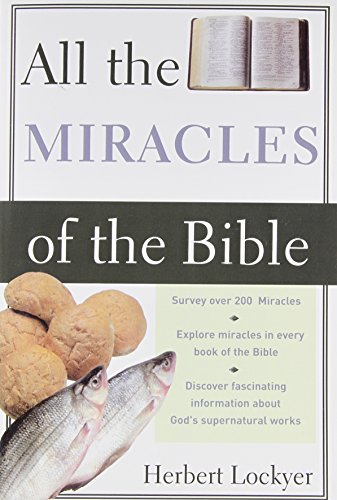Quotes about Miracles-General
I never have any difficulty believing in miracles, since I experienced the miracle of a change in my own heart.
The miracles Jesus performs…do not compel faith; but those with faith will perceive their significance.
Matthew, The Expositor’s Bible Commentary, Zondervan, 1984, p. 363. www.zonderban.org. Get this book!
Our salvation is a miraculous intervention of God. Evangelism is all about miracles. We pray asking God to change the human will, or to override and arrange the natural course of things in certain ways, or to defy all odds.
Seeking Miraculous Healings: Musings and Cautions, Christian Communicators Worldwide, www.CCWtoday.org. Used by Permission.
We believe that there is a Creator God who can intervene in the affairs of this world. This makes [miracles] theoretically possible, if God is more powerful than the so-called forces of nature, for Him to supersede the forces of nature and act in ways we call miraculous. We say that God does indeed do this occasionally.
His Works Authenticate His Words by Ajith Fernando taken from The Supremacy of Christ by Ajith Fernando, copyright 1995, Crossway Books, a division of Good News Publishers, Wheaton Illinois 60187, www.crosswaybooks.org, p. 67.
[Three reasons Jesus performed miracles:] 1. To show compassion. 2. To glorify God. 3. To give evidence to support His claims.
Jesus, Miracles and Ministry Today by Ajith Fernando taken from The Supremacy of Christ by Ajith Fernando, copyright 1995, Crossway Books, a division of Good News Publishers, Wheaton Illinois 60187, www.crosswaybooks.org, p. 80.
Belief in miracles does not destroy the integrity of scientific methodology, only its sovereignty. It says in effect that science does not have a sovereign claim to explain all events as natural, but only those that are regular, repeatable and/or predictable.
Tim Keller says, “Jesus’ miracles did not merely show off the naked fact of Jesus’ power; they revealed the redemptive purpose of His power.”
The miracles were to the gospel as seals are to a writing.
[Miracles are] the extraordinary work of God that involves His immediate and unmistakable intervention in the physical realm in a way that contravenes natural processes.
It should come as no surprise of the God who supernaturally created the universe should choose at times to supernaturally intervene in it.
While all miracles are supernatural acts of God, not all supernatural acts of God are miracles.
Miracles, according to the biblical definition, preclude the necessity of secondary means and are not limited by the laws of nature. They involve God’s supernatural intervention. Jesus’s miracles were never limited; they were never doubted; they were performed in public; they were abundant and instant. Anything that would claim the title miracle today should also possess those qualities. Unfortunately, the contemporary church tends to trivialize the idea of miracles by labeling anything out of the ordinary as miraculous.
God the Father by John MacArthur and Richard Mayhue taken from Biblical Doctrine by John MacArthur and Richard Mayhue, copyright 2017, Crossway Books, a division of Good News Publishers, Wheaton Illinois 60187, www.crosswaybooks.org. Page 217-218.
A miracle can be described as God suspending natural laws and personally reaching into life to rearrange people and their circumstances according to His will
God the Father by John MacArthur and Richard Mayhue taken from Biblical Doctrine by John MacArthur and Richard Mayhue, copyright 2017, Crossway Books, a division of Good News Publishers, Wheaton Illinois 60187, www.crosswaybooks.org. Page 217.
A miracle from God may be defined as follows: an observable phenomenon delivered powerfully by God directly or through an authorized agent (dynamis), whose extraordinary character captures the immediate attention of the viewer (teras), points to something beyond the phenomenon (semeion), and is a distinctive work whose source can be attributed to no one else but God (ergon).
God the Father by John MacArthur and Richard Mayhue taken from Biblical Doctrine by John MacArthur and Richard Mayhue, copyright 2017, Crossway Books, a division of Good News Publishers, Wheaton Illinois 60187, www.crosswaybooks.org. Page 217.
Miracles strengthen faith, but only God’s Holy Spirit can produce faith.
Christ Creates Conflict in the Synagogue. The sermon originally appeared (https://www.gty.org/library/sermons-library/42-182/christ-creates-conflict-in-the-synagogue) at www.gty.org. © 1969-2008. Grace to You. All rights reserved. Used by Permission.
A miracle is an extraordinary event wrought by God through human agency, an event that cannot be explained by natural forces. Miracles are always designed to authenticate the human instrument God has chosen to declare a specific revelation to those who witness the miracle.
Most biblical miracles happened in three relatively brief periods of Bible history: In the days of Moses and Joshua, during the ministries of Elijah and Elisha, and in the time of Christ and the apostles. None of those periods lasted much more than a hundred years. Each of them saw a proliferation of miracles unheard of in other eras. Even during those three time periods, however, miracles were not exactly the order of the day. The miracles that happened involved men who were extraordinary messengers from God – Moses and Joshua, Elijah and Elisha, Jesus and the apostles. Aside from those three intervals, the only supernatural events recorded in Scripture were isolated incidents.
God confirmed His Word through the apostles by the miracles that they were able to do. The New Testament indicates that only the apostles and those who were closely associated with them had the power to do miracles. That is why 2 Corinthians 12:12 speaks of such miracles as “the signs of an apostle.”
Nowhere on the pages of the Gospel record did anyone ever deny the reality of Jesus’ miracles. Who could deny them? There were too many, and they had been done too publicly to be dismissed by even the most skeptical gainsayers. Of course, some desperately tried to attribute Jesus’ miracles to the power of Satan (Matthew 12:24). No one, however, ever denied that the miracles were real. Anyone could see that He had the power to cast out demons and do miracles at will. No one could honestly question whether He truly had power over the supernatural world.
A miracle is God’s direct, sovereign intervention into the natural world. It is an event so contrary to the normal course of events that there is no scientific or naturalistic explanation for it other than the power of God. There is no natural insight to explain the parting of the Red Sea, restoring the sight of those blind from birth, or raising people from the dead.
The New Testament without the miracles would be far easier to believe. But the trouble is, would it be worth believing?
The attempt of the older liberal theologians to remove the miraculous from the life of Jesus was doomed to failure for they found that the miracles we so intertwined with the teaching and the supernatural with the natural, that they could not discard the one and retain the other (Norman Anderson).
Taken from Jesus Christ: The Witness of History by Norman Anderson, p. 26-27. Copyright (c) 1985, InterVarsity Christian Fellowship/USA. Used with permission of InterVarsity Press, P.O. Box 1400, Downers Grove, IL 60515. www.ivpress.com, p. 77.
We need to get something straight. God performs miracles. Most of His miracles happened in three periods of history: The time of Moses and Joshua, the time of Elijah and Elisha and the time of Jesus and the apostles. I believe God still does miracles and it’s witnessed every time He opens a person’s heart to respond favorably to Christ, but for the most part, miracles in the official sense are infrequent. As a matter of fact, the Bible says nothing about expecting God to intervene in our life through miracles. If anything, the Bible warns in these “latter days” to be on the lookout for false miracles from the evil one.
Christianity is a faith that is based upon and rooted in miracles. Take away miracles, and you take away Christianity.
It is clear that however we define a miracle we must place the alleged miracles of today in a different class, or category, from those recorded in the Scriptures. No one is bringing something out of nothing these days—unless it is the currency produced by the federal government!
Several inadequate definitions of miracles need to be rejected:
1. Some define a miracle as a direct intervention of God into the world. But “intervention…into” implies that God is outside the world and only occasionally intrudes.
2. Some define a miracle as God working in the world apart from means to bring about the desired result. But God often uses “means” or “instruments” in performing the miraculous, as in the case of Jesus’ feeding of the 5,000.
3. Others define a miracle as God acting contrary to natural law. But this implies there are forces (“natural laws”) which operate independently of God, forces or laws that God must violate or override to perform a miracle. God is the author and providential Lord over all natural processes.
Introduction to Divine Healing, November 6, 2006, www.enjoyinggodministries.com. Used by Permission.
A miracle is an event in nature, so extraordinary in itself and so coinciding with the prophecy or command of a religious teacher or leader, as fully to warrant the conviction, on the part of those who witness it, that God has wrought it with the design of certifying that this teacher or leader has been commissioned by Him.















